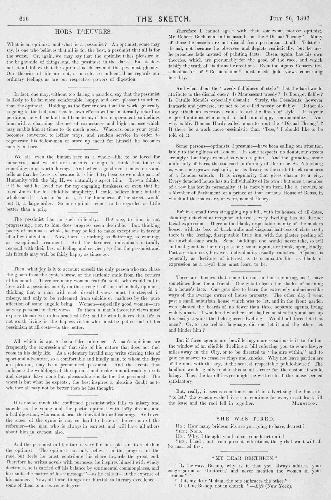|
_____
1 Mathilde Serao, an Italian novelist. [back]
2 A Spanish novelist. [back]
3 Verlaine and Rimbaud, two poets of the Parisian Decadence. [back]
4 A Norwegian playwright. [back]
5 Guy de Maupassant, Paul Bourget, and Pierre Loti, novelists of the Decadence. [back]
6 Catulle Mendès, a Parisian poet and novelist. [back]
7 Jean Richepin, ditto. [back]
8 Mr. Oscar Wilde. [back]
9 Mr. William Archer, a newspaper critic. [back]
10 Mr. George Moore, an author and newspaper critic. [back]
_____
NOTE.—These verses refer to a literary phenomenon that will in time become historical, that phenomenon being the sudden growth, in all parts of Europe, of a fungus-literature bred of Foulness and Decay; and contemporaneously, the intrusion into all parts of human life of a Calvinistic yet materialistic Morality. This literature of a sunless Decadence has spread widely, by virtue of its own uncleanness, and its leading characteristics are gloom, ugliness, prurience, preachiness, and weedy flabbiness of style. That it has not flourished in Great Britain, save among a small and discredited Cockney minority, is due to the inherent manliness and vigour of the national character. The land of Shakespere, Scott, Burns, Fielding, Dickens, and Charles Reade is protected against literary miasmas by the strength of its humour and the sunniness of its temperament.—R.B.
__________
‘The Dismal Throng’ prompted this response from The Stage (6 July, 1893 - p.11):
The Idler for this month has an interesting descriptive paper, illustrated on the usual scale of liberality adopted by the editors, on Alphonse Daudet at home. Mr. Robert Buchanan, in a set of verses, girds at the leaders of the Ibsen and other naturalistic schools—”The dismal throng of literary undertakers” he calls them. This idea the artist, George Hutchinson, bears out by representing the objects of Mr. Buchanan’s ire as funeral mutes. Taste of this sort is not of the best. The vignettes side by side with the stanzas are, however, capital, more so than some of the verses. There is a droll one to this stanza about Henrik Ibsen—
There’s Ibsen, puckering up his lips,
Squirming at Nature and Society,
Drawing with tingling finger-tips
The clothes off naked Impropriety!
So nice, so nasty, and so grim,
He hugs his gloomy bottled thunder;
To summon up one smile from him
Would be a miracle of wonder!
This not over brilliant stanza is quite polite in comparison with some of the others. But is it quite fair? How can the venerable little Scandinavian be logically accused of taking the clothes off naked impropriety? To the verses there is this remarkable footnote:—
These verses refer to a literary phenomenon that will in time become historical, that phenomenon being the sudden growth, in all parts of Europe, of a fungus-literature bred of Foulness and Decay; and contemporaneously, the intrusion into all parts of human life of a Calvinistic yet materialistic Morality. This literature of a sunless Decadence has spread widely, by virtue of its own uncleanness, and its leading characteristics are gloom, ugliness, prurience, preachiness, and weedy flabbiness of style. That it has not flourished in Great Britain, save among a small and discredited Cockney minority, is due to the inherent manliness and vigour of the national character. The land of Shakespere, Scott, Burns, Fielding, Dickens, and Charles Reade is protected against literary miasmas by the strength of its humour and the sunniness of its temperament.—R.B.
The general contents of the part, including contributions by Jerome K. Jerome, Joseph Hatton, Eden Philpotts, Alfred Berlyn, Robert Barr, &c., are again entertaining.
___
And this from ‘Marmiton’ in The Sketch (26 July, 1893 - p.22):
|

